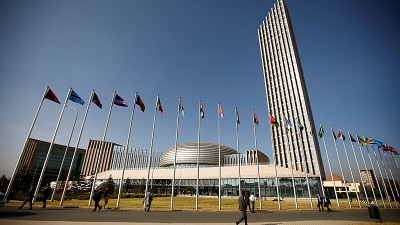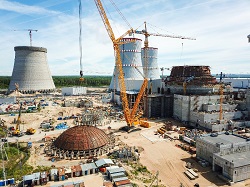
All set for SADC annual summit amid COVID-19 concerns

By Kizito Sikuka
The 40th Southern African Development Community (SADC) Summit scheduled for Maputo, Mozambique on 17 August will for the first time in history be held in a virtual format.
This is due to health measures and travel restrictions imposed by most Member States in response to the novel coronavirus, commonly known as COVID-19.
Described as the most serious health emergency in generations by the World Health Organisation (WHO), the pandemic has affected the global socio-economic landscape and resulted in the loss of many lives.
In light of this, the 2020 SADC Summit will be coordinated from Mozambique with other Heads of State and Government linking up via video conferencing technology from their various capitals.
The fact that the region has managed to convene the 40th SADC Summit in a virtual format is commendable, and a demonstration of SADC ability to move in unison and conquer challenges no matter the magnitude of a challenge.
Running under the theme “SADC: 40 Years Building Peace and Security, Promoting Development and Resilience to face global challenges”, the virtual summit will be held under a reduced agenda to allow the leaders to focus more on critical issues in the region.
This article looks at some of the major issues expected to be discussed by the 40th SADC Summit.
Coordinated response to COVID-19 pandemic
Extraordinary times call for extraordinary measures.
As such, one of the main highlights at the Summit will be how SADC Member States – both at the national and regional levels – could combat the coronavirus, which has not only disrupted the implementation of various regional activities and projects, but also caused the loss of lives.
In this regard, the Summit is expected to explore ways on how Member States could invest more resources in strengthening their public health systems and implement measures to curtail the spread of the virus.
For example, Member States that are beginning to reopen their economies as well as air travel and land borders should observe and enforce strict anti-coronavirus standards such as social distancing at workplaces, regular health screenings and wearing of masks at all times.
It is also critical for countries to put in place vibrant social protection measures to cushion the population from the effects of loss of income, particularly due to the economic lockdown imposed by a number of countries in response to the pandemic.
Post-2020 SADC agenda
The current SADC development blueprint, the Revised Regional Indicative Strategic Development Plan (RISDP) 2015-2020, is coming to an end in December.
Therefore, the 40th SADC Summit is expected to review progress towards the development of a post-2020 SADC agenda.
Formulation of a new 30-year vision that will lay the foundation and set a strategic direction for the region to implement its programmes and activities until 2050 is already at an advanced state, and a progress report is set to be presented to the Heads of State and Government for deliberation.
The proposed SADC Vision 2050 will be aligned to the African Union Agenda 2063 and a resolution was also made by the region that the vision should inform the development of the RISDP 2020-30.
In a departure from the previous regional strategic plans, the RISDP 2020-30 is expected to combine interventions previously presented under the Revised RISDP and the Strategic Indicative Plan for the Organ on Politics, Defence, and Security Cooperation.
The decision to include peace, security and governance matters in the RISDP 2020-30 is important as the two strategic plans are complementary and seek to achieve the same common objective.
State of regional food security
The 2020 Synthesis Report on the State of Food and Nutrition Security and Vulnerability in southern Africa released in July indicates that about 44.8 million people across 13 SADC Member States are food insecure this year.
This is due to various factors, including a poor harvest and low rainfall experienced during the 2019/20 agriculture season.
The impact is further exacerbated by the current effects of COVID-19.
The 40th SADC Summit is expected to discuss measures to address the food insecurity.
Possible strategies include a combination of short-term measures such as social protection programmes to support those immediately affected, as well as more medium- to long-term strategies focused around areas such as the maintenance of domestic and international supply chains and incentives for the diversification of agricultural production.
Taking stock of the industrialization agenda
Summit will also take stock of the implementation of the SADC Industrialization Strategy and Roadmap 2015-2063, which was adopted in 2015 to unlock the industrial potential of the region.
Industrialization is a top priority for southern Africa, and Member States are implementing various measures to accelerate economic growth through industrial development.
Summit is expected to receive a progress report on the implementation of the industrialization strategy.
In August 2109, the region adopted a Protocol on Industry in a bid to ensure the attainment of unified goals and cohesion among Member States in terms of their industrialization policies and strategies.
The protocol is a binding instrument that gives legal effect to the SADC Industrialisation Strategy and Roadmap and seeks to ensure adequate coordination, monitoring and evaluation of implementation.
Strengthening peace and security
On the political front, the leaders will remain seized with the political and security situation prevailing in the region since stability is a key conduit for sustainable development.
The SADC region has generally enjoyed stability despite some pockets of volatility in northern Mozambique and the eastern part of the Democratic Republic of Congo.
Summit is expected to take stock of interventions undertaken by the region to promote peace and stability in these and other Member States.
As captured by the theme of the Summit – “SADC: 40 Years Building Peace and Security, Promoting Development and Resilience to Face Global Challenges” – peace and stability are a key conduit for sustainable development and regional integration.
40 years anniversary
The SADC regional integration journey has been long but worthwhile.
From a series of consultations held in the late 70s by representative of the Frontline States to forge closer alliance, southern Africa was finally able to form a vibrant regional organization, the Southern African Development Coordination Conference (SADCC) in 1980, which was later transformed to SADC in 1992.
This April, SADC turned 40 years, and as part of its celebrations, the Summit will take stock of its integration journey.
New SADC leadership
The 40th SADC Summit will see Mozambican President Filipe Nyusi assuming the rotating SADC chair from President John Magufuli of the United Republic of Tanzania.
The SADC Summit is responsible for the overall policy direction and control of functions of the Community, ultimately making it the supreme policy-making institution of SADC.
It is made up of all SADC Heads of States or Government of Member States and is managed on a Troika system that comprises the current SADC Summit Chairperson, the incoming Chairperson (the Deputy at the time), and the immediate previous Chairperson.
With respect to the Organ on Politics, Defence and Security Cooperation, President Mokgweetsi Masisi of Botswana will assume the chairmanship from President Emmerson Mnangagwa of Zimbabwe.
The SADC Organ on Politics Defence and Security Cooperation is also managed on a Troika basis and is responsible for promoting peace and security in the SADC region. It consists of a Chairperson, Incoming Chairperson and Outgoing Chairperson, and reports to the SADC Summit Chairperson.
The SADC Summit and the Organ Troika are mutually exclusive, and the Chairperson of the Organ does not simultaneously hold the chair of Summit. sardc.net











































